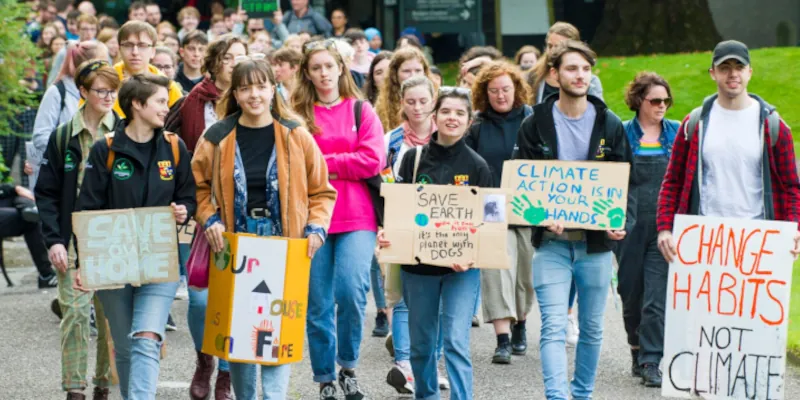In This Section
- Home
- About
- Student Led
- Research Informed
- Practice Focused
- Resources
- Case Studies
- Green Labs Community
- News
- Office of Sustainability and Climate Action
Climate Activism 101

Climate activism is a global movement dedicated to fighting climate inaction and climate injustice to create a sustainable and equitable world for all. It often involves campaigning and lobbying political leaders to take responsibility and achieve critical climate goals whilst holding industry players accountable for their environmental impacts. The climate movement has been around for decades, but has grown in strength and urgency in recent years in response to anthropogenic climate change and biodiversity loss.
With global temperatures predicted to rise significantly in the coming years if we don’t immediately and radically reduce greenhouse gas emissions, the importance of climate activism (and activists) has never been so clear. But how do you get involved with climate activism in the first place?
Find A Group
A good place to start is to find some like-minded people to work with. You can’t take on these challenges alone and getting involved with an environmental group allows you to get proactive, connect with people, and share the workload. To make finding a group easier, we’ve compiled a directory of environmental groups that you can use to find a local or national organisation to join. If you can’t find one that aligns with your concerns and passions, why not start your own group?
Remember That We All Start Somewhere
Don’t let the perception of knowing less than others put you off getting involved with climate activism. No one expects you to be a climate expert. When I first joined the UCC Environmental Society in 2018, I had next to no environmental knowledge. Feeling intimidated when starting something new is understandable, but you’d be surprised by how fast you pick up the lingo and gain an understanding of ongoing and emerging environmental issues. With help and support from other activists, you’ll learn as you go.
Find What Works For You
Climate activism comes in all shapes and sizes: event organisation, speaking at protests, administrative duties, facilitating meetings, financial management, graphic design, and communications, to name but a few. Play to your strengths and volunteer for tasks that align with your skills and interests. It’s also good to remember that activism happens everywhere; from the perusal of climate action and regenerative culture in the workplace, to conversations that happen with friends between classes. Furthermore, activism doesn't always have to be extractive. Climate activism that facilitates celebration of the living world, and highlights how far we've come as a result of collective action, is equally as important as that which highlights climate inaction.
Navigating Burnout
If I could offer one general piece of advice, it would be this: Beware of burnout. It’s important to know what your limits are (both emotionally and workload-wise). I find this is a useful question to reflect upon before committing to joining a new group or working on a new project: Do I have the capacity for this? There’s no sense in over-committing or over-burdening yourself to the point where you’re overwhelmed and stressed. With limited time between work, college, and your social life, it’s advisable to prioritise your time to maximise the impact of your climate activism and safeguard your well-being. If people aren’t respectful of your boundaries, then it’s probably not a project or group you want to be involved with.
These are heavy topics and sometimes climate work can leave us feeling emotionally drained, overwhelmed, or even demoralised. Since we live in a system that prioritises paid work and productivity over everything else, this can make the emotional draining work of an activist even more challenging. Our capitalist, productivist society doesn't just exacerbate the climate crisis by facilitating exploitation of people and the planet, it also makes it difficult for us to rest and restore ourselves. Therefore, building climate resilience on an individual and community level is critically important, especially when we need to work together to create effective solutions. Looking after your mental and physical health, taking time to rest, and practising self-care is critical to climate action.
Here are some ways you can practise self-care:
- Share your feelings with others.
- Be careful what you consume. Though it’s vital we know the facts about the climate crisis, it’s important to ensure you access all the (factual) good news you can.
- Remember that it's normal and healthy to take a step back from climate activism.
- Don't be afraid to laugh. We're in a painful situation, but humour counts for a lot. It bonds us, restores us and offers us a different perspective.
- Different self-care techniques work for different people; find what works for you. This could be journalling, taking up new hobbies, getting out into nature, talking with others, socialising with friends and family, or taking a social media break. Make time for things that bring you joy.
At the end of the day, climate activism is not about perfection but working together to build a better world, for our people and our planet. Putting yourself out there can seem nerve-wracking, but in my experience, it leads to valuable experiences and connects you with a passionate and driven community, so why not give it a shot?
Green Campus
Contact us
University College Cork, College Road, Cork T12 YN60,
- greencampus@ucc.ie
- Dr Maria Kirrane, Sustainability Officer - m.kirrane@ucc.ie
